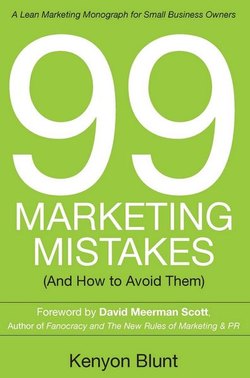Читать книгу 99 Marketing Mistakes - Kenyon Blunt - Страница 22
На сайте Литреса книга снята с продажи.
ОглавлениеMistake #16
Not Asking For Referrals
Every business owner knows that referrals are the best way to grow their business. It’s even better because referrals are free. According to a survey by eMarketer, 85 percent of small companies said word-of-mouth referrals are the primary way prospects find out about their businesses. Dale Carnegie once noted that 91 percent of customers said they’d give referrals if asked, but only 11 percent of salespeople asked for them. Does this seem like an odd contradiction to you?
According to referral expert, Bob Burg, in his book 10Endless Referrals, the following is the central premise of referral marketing:
All things being equal, people will do business with, and refer business to, those people they know, like, and trust.
So why are you reluctant to ask for them? Is it fear? The worst thing that can happen is they’ll say “no.” The hardest part is getting up enough courage to ask. Just swallow your pride and make the request.
Why Ask for Referrals?
There are some very compelling reasons for you to make referrals part of your ongoing marketing plan. Did I mention they don’t cost anything? Everyone has a network of contacts, and it’s highly likely they know someone to refer to you. And, consider this; your customers are better at marketing than you. Well, maybe it’s not that they’re better – it’s just that prospects are more likely to believe them over your sales pitch. Referrals are like compound interest, they multiply when referred customers give you additional references.
Why Clients Don’t Send You Referrals
Four reasons account for your lack of referrals:
1 You didn’t ask for them. Small business owners need to do a simple thing – learn how to ask for referrals. You may be too focused on current clients or a host of other issues, but asking for referrals should be part of your ongoing marketing strategy.
2 You didn’t “wow” your clients with customer service. You have to do more than meet expectations. Make sure that you leave customers with a memorable experience at the end of your interaction together.
3 They’re busy. Everyone is busy. Make sure that you keep in touch with past clients, so they remember who you are. A regular cadence of communications will keep you top-of-mind.
4 They had a bad experience. Your client may have had a bad experience, and you may not be able to get a referral. You can still get an opportunity to regain their trust, and that’s worth a lot.
How to Ask for Referrals
Here are my recommendations on how to ask for referrals:
Create a process. Develop a process to ask your clients for referrals regularly. With many projects, there’s a final meeting with the client, which is a perfect time to ask. You could also schedule monthly check-ins with the client and make referrals part of the agenda.
Give them something. Sometimes you may want to sweeten the pot. Some companies offer discounts on future services, a prize, or other referral incentives. You’re rewarding the people who are helping you build the business.
Develop your network. The stronger your network, the more referrals you’ll receive. Attend networking events and join referral networks or online communities like LinkedIn.
Use a script. Until you’re comfortable asking for referrals, develop a script that you can use. It might be something like this: “I’m happy you’re pleased with my work. I’m always looking for referrals and wonder if you know anyone else who might be interested in ____________ (what you do).”
Make sure to request referrals face-to-face. It’s more respectful for your clients and more successful. When you’re asking for a referral, it is also an excellent time to ask for a testimonial.
Before you start a referral program, it’s essential to change your mindset and commitment. It won’t happen overnight, but your referral engine will eventually pay off.
10 Bob Burg, Endless Referrals, New York, McGraw-Hill Education, 2005.
